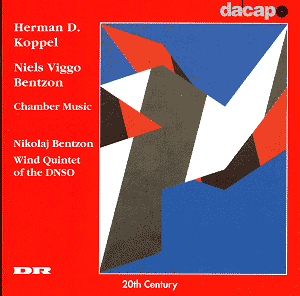I try to approach music that is new to me without any
more preconceptions than can be helped. My preconceptions here
were as follows. Herman Koppel is the pianist whose recordings
of Nielsenís piano music introduced me to that repertoire and
I did not know he composed. Niels Viggo Bentzon is a composer
of big gritty symphonies a few of which have been issued on LP
or CD and some of which I like. Here we have a disc of chamber
music for wind and piano by both composers. Da Capo have provided
their usual excellent recording quality and the performers are
obviously completely at home in this genre, partly because the
music is audibly Nielsen-influenced and partly because the pianist
is Bentzon junior.
Koppelís Sextet is the pleasure of the disc,
a real discovery. He composed it in 1942 and I was not surprised
to read in Bertel Krarupís interesting notes that a fellow musician
asked him where he got all that cheerfulness from. His Sextet
reminds me of a hybrid Nielsen/Martinů
and is so much fun that I would recommend chamber groups to make
more use of it. It is an odd work to compose if you are of Polish-Jewish
extraction and living in Nazi-occupied Denmark. The first movement
starts as a lively march and changes into jazzy
music strongly reminiscent of Martinůís La Revue
de Cuisine. It also has a strong Nielsen influence in Koppelís
frequent use of repeated notes and in his ability to endow each
instrument with a separate personality. The five wind instruments
definitely sound as if they have their own stories to tell and
only the piano is relegated to accompaniment status, a status
it maintains throughout. The pastorale is a sort of extended decoration
without a tune, but none the worse for that. The finale is a divertissement,
busy, chirpy and entertaining music such as was being written
in the 1920s, 1930s and 1940s by the likes of Stravinsky, Martinů
and Poulenc. Koppelís Sextet does not have the sheer genius of,
say, Stravinskyís Octet, but it could easily share a programme
with it and with the above-mentioned Martinů and would send
the audience home happy. A lovely discovery, thank you Da Capo!
Bentzonís two pieces make up the bulk of the
disc and are a very different matter. Whilst I took notes on all
seven movements in the two works I think they can be bundled together
under the heading ĎHindemith-in-less-inspired-moodí. Everything
is very craftsmanlike but lacks passion. Indeed in some movements,
especially in his Sextet, Bentzon seemed to be hectoring me. The
piano thumps away in a fashion more angry than lively as if saying
"I demand you listen!" The music is not particularly
modern in idiom, a surprise after Bentzonís symphonies, some of
which are decidedly so. I just felt shouted at. The Wind Quintet
of 1958 (his fourth despite the number) starts very seriously
with a motto theme. Bentzon is fond of these and it is developed
into a comparatively light mood by the end. The second movement
was similar in feel and the third is a much more cheerful hymn-like
Pastorale which is easy to enjoy. The finale just rattled on!
The Sextet is similarly dominated by mottos being developed but
I was left wishing that they had got somewhere, also this work
in particular does too much shouting. Not a lot of laughs then
on this disc and the issue is whether it is worth its price for
the delightful Koppel Sextet. I think it probably is because otherwise
you will never get to hear it, and you should.
Dave Billinge
